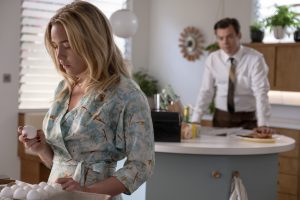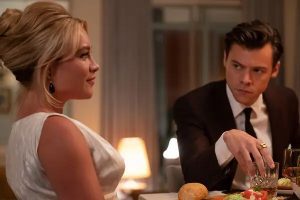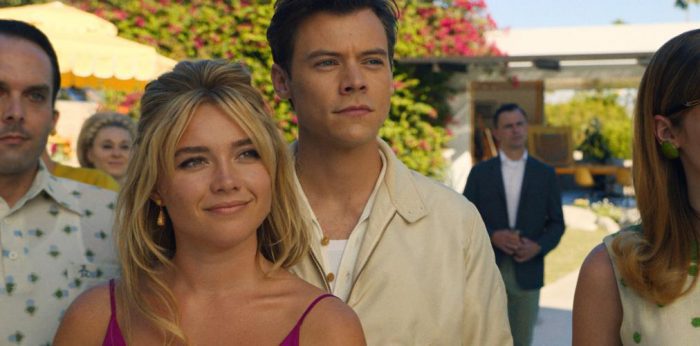Movie Review: Sci-fi thriller ‘Don’t Worry Darling’ has few thrills
Reviewed by Jeffrey Sanzel
Actor Olivia Wilde made her directorial debut with Booksmart (2019), a coming-of-age comedy about high school seniors looking to break the rules on their final day of classes. The hugely successful film received critical accolades, landed on multiple top-ten lists, and garnered many nominations.

Unfortunately, Wilde’s sophomore outing, Don’t Worry Darling (New Line Cinemas), is an empty, tedious psychological thriller that borrows liberally but poorly from better and smarter films.
Perfect couple Alice (Florence Pugh) and Jack (Harry Styles) reside in an idyllic 1950s community in a seemingly perpetually honeymoon of romance, domesticity, and sex. The California oasis, all sunlight and happiness, is the town of Victory; the name derives from the mysterious company for which the men work.
Each morning, the wives stand on their perfectly manicured lawns and bid goodbye to their spouses, who join an automotive caravan into the adjunct desert where they labor on an unnamed project. The stay-at-home wives clean, cook, and then visit the club pool where they while away the day gossiping. They vaguely speculate on the corporation’s actual work, discouraged from questioning their husbands on the much-lauded “development of progressive materials.” The Stepford vibe permeates the entire film.

The company/community is the brainchild of Frank (Chris Pine), a cult-like figure who stares and smirks and even watches as the happy couple has sex in his kitchen. He leads the group in question-response mantras: “What is the enemy of progress?” “Chaos.” “What are we doing?” “Changing the world.” References to family and to “the mission” are trotted out. The generic catchphrases somehow overwhelm the attempts at tension, resulting in an underwhelming blandness. As Frank lords over the men, his wife, Shelly (Gemma Chan), dominates the women. In a dance class, she encourages them to chant, “There is beauty in control. There is grace in symmetry. We move as one.”
Eventually, cracks begin to show, beginning with ostracized Margaret (KiKi Layne), who went with her son out into the forbidden desert but returned without him. At an afternoon gathering, Margaret claims that Victory took her son away from her, and her husband quickly subdues her. The community sees Margaret as mentally imbalanced and dismisses her accusation. However, there are other indications that something is not wholly right or real in this utopia: A topless woman strolls poolside. Freedom in language uncommon in the period. Jack’s strange dance when he is promoted to the inner circle. Whole eggs that are empty. In the midst of this, Alice has visions and hallucinations, driving her to question the fabric of her life.

Conceptually, there is little new on offer in Don’t Worry Darling. The ideas have been presented in countless films. And while there is much that is stylish in the design and Matthew Libatique’s rich and often sunbaked cinematography, the action becomes predictable and repetitive, plodding along with few surprises.
Florence Pugh gives the scream queen Alice as many dimensions as possible. She is a riveting and honest performer and creates a dimensional woman questioning both her world and her sanity. Pugh makes every moment count as she battles with an ever smaller grasp of reality and what seems to be communal gaslighting.
Styles’ Jack is stiff in a stiff role and incapable of raising the (possibly intentionally?) stilted dialogue. Chris Pine succeeds to a certain extent in the enigmatic Frank, but there is a certain lack of texture to his villain. Wilde is strong as the gossipy and slightly bullying Bunny, Alice’s confidant. Late in the film, she has the most powerful revelation, one of the few moments that manages to be chilling and cathartic. Gemma Chan finds the right balance in the ice princess Shelley. Timothy Simmons provides a creepy, if obvious, doctor, playing it just to the edge of too much. The supporting cast fills out the town ensemble but is given little else: the men curry favor with Frank, the women with Shelley.
A great deal of publicity has swirled around the film, with backlot drama—initially between the director and the originally cast Jack, Shia LaBeouf, and later between the director and Pugh. But, in the end, the white noise is irrelevant.
And while Don’t Worry Darling attempts to make statements about society and gender roles, the pretentious screenplay by Katie Silberman (from a story by Silberman, Carey Van Dyke, and Shane Van Dyke) fails to answer any of them. Wilde’s showy but hollow direction does nothing to solve the problems or enhance the experience. In the end, Don’t Worry Darling becomes relentless shrill, building to an ambiguously frustrating cheat of an ending.
Rated R, the film is now playing in local theaters.







